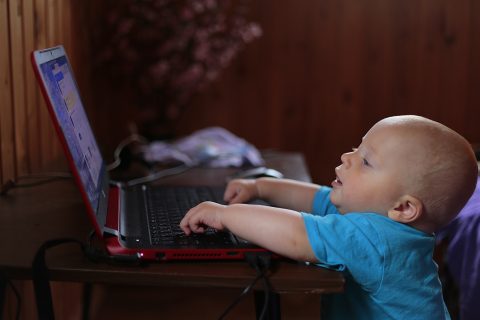Do Algorithms harm our Kids?
Written by Andreas Maier.
In the time of Corona Virus Quarantine, we have to spend much time at home and for many of us, it is difficult to entertain our kids. Often, we choose digital media as a means for distraction in order to survive the quarantine. Many parents are in fear that algorithms of large platforms such as YouTube may influence their children and expose them to inappropriate content. One example of an alarmed parent is Morf who happens to also operate a YouTube Channel. In one of his videos, Morf warns that YouTube and capitalism are degenerating our children.
If you do not have time to watch his full 40-minute analysis, I have a short summary of the entire plot: As the algorithms of YouTube and other platforms select what we are watching, an entire industry creating low-quality videos for children was created earning money from showing cheap flicks to kids. This series of events also coined the name “Elsagate”. In most parts, I follow Morf’s analysis and he is right to criticize this. Much of such content is of low quality. In addition, to his observations, I am also worried about things popping up on YouTube as described in the Momo Challenge hoax. Therefore, I decided to ban YouTube for my own kids.
While I found Morf’s video very entertaining, I think the analysis needs to go a little deeper, in order to understand the entire chain of causation. In particular, I make the following observations:
1. The titles of the videos, like “Cars 2 Silver Lightning McQueen Racer Surprise Eggs Disney Pixar Zaini Silver Racers by ToyCollector”, are probably a result of optimizing search performance: You want to have as many relevant words in the title, to generate hits. Therefore, the strange titles that Morf mentions appear. As a result, you generate a lot of hits and revenue doing so. So it’s the algorithms and capitalism that we have to blame!

2. The strange titles do not create a problem with most of the audience, as they appear only shortly when moving from one video to the next one. Most of the time, I would assume that the persons watching this are children of young age, maybe between one to three years. They are not appalled as they even cannot read. They probably even like what they are seeing as the content is colorful and supported by pleasant sounds. Things like the switching heads are probably interesting because recognizing faces is one of the first things that the human brain learns. As such, the videos actually suit their purpose. Kids stay attracted and keep watching. As a result, they get more and more stupid. We observe: Capitalism and algorithms degenerate our children!

3. A third thought: Why are kids actually watching this? I would assume that there are many parents that try to keep their kids busy by letting them watch YouTube and other online media. Instead of playing with the kids themselves, they rather prefer to do other things. Hence, the question is whether the degenerated system is not caused by the search algorithm but rather by parents who let their children watch such content. This is probably not something a broad audience likes to hear, because it’s all the lazy parents’ fault!

4. Now you may want to ask, why many parents do so. The reason for this is that being a parent and raising kids is a hell of a job and anybody who is a parent knows what I am talking about. This is also something that is not very popular to talk about. But I guess, this would be the point where one could actually intervene.
Of course, it is more pleasant to stop the analysis at Point 1 or Point 2, because we can blame evil capitalism or algorithms that are uncontrollable and dangerous. But as often causes go deeper and we as parents also have to keep in mind our responsibility. For these reasons, parents also often feel lonely, misunderstood, and sometimes even unable to cope.

Now the question is what you would like to do about this?
One obvious solution is to stop our children from using YouTube and other poorly curated sources of entertainment. This would be an intervention at Point 3. I am actually doing this. For example, I found that the content in Amazon Free Time is of very high quality and our kids love it. I personally check what our kids are doing and I can also block specific content, e.g. the Teletubbies because I do not like them. For older kids, we are also working with video games, e.g. Nintendo has wonderful interactive toys in their Nintendo Labo Series. Also, Lego Boost is a wonderful toy for kids. For me, this is a very good solution as they do not only focus on the screen and to not spend hours in front of their tablet. This is also how we manage to get through the Corona Crisis. However, it comes at the disadvantage that it costs money.
Also, apps stores offer many interesting apps for children. Often, you can download them for free as long as they are new to advertise them. Only later, many producers change to a pay-per-download model. In particular, our kids enjoy games from Toca Boca and Sago Mini. However, there is also a lot of low-quality material and parents need to invest their time in selecting the appropriate material for their kids. Again, my advice would be not to focus only on electronics, but also on conventional toys and board games that can be bought at low cost or even constructed yourself or simply printed from the Internet. So here the required resource is time, not money.
Other interventions can aim at Point 4 which is also actually being done in some countries. In Germany for example, we have “Sendung mit der Maus”. This is a government-financed series of educational resources. They started off with a television series that now runs for almost 50 years and has been extremely successful. By now, they have developed also apps and programs that are freely available in Google’s and Apple’s app stores. Obviously, other measures would be to support parents further by reduced fees for day-care, more steps towards state-financed educational resources, direct monetary support, flexible work and home-office opportunities, parent-child offices created by the employer, or other means to support the parents in their duty to raise the taxpayers of the next generation. I personally think that sharing useful advice also falls into the category of Point 4 Interventions.
In conclusion, we observe it’s us who are using the algorithms. Therefore, we also have the power to control them, for example by not letting our children watch low-quality content. Don’t be fooled to stop your thinking already at Point 1 or Point 2.
If you liked this essay, you can have a look at my YouTube Channel. This article is released under the Creative Commons 4.0 Attribution License.
